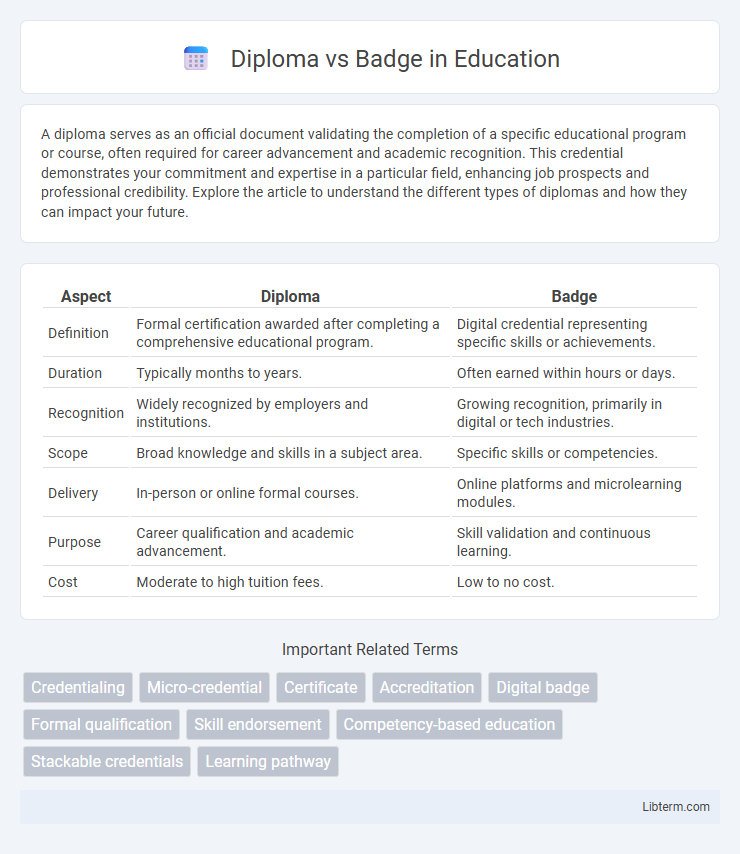A diploma serves as an official document validating the completion of a specific educational program or course, often required for career advancement and academic recognition. This credential demonstrates your commitment and expertise in a particular field, enhancing job prospects and professional credibility. Explore the article to understand the different types of diplomas and how they can impact your future.
Table of Comparison
| Aspect | Diploma | Badge |
|---|---|---|
| Definition | Formal certification awarded after completing a comprehensive educational program. | Digital credential representing specific skills or achievements. |
| Duration | Typically months to years. | Often earned within hours or days. |
| Recognition | Widely recognized by employers and institutions. | Growing recognition, primarily in digital or tech industries. |
| Scope | Broad knowledge and skills in a subject area. | Specific skills or competencies. |
| Delivery | In-person or online formal courses. | Online platforms and microlearning modules. |
| Purpose | Career qualification and academic advancement. | Skill validation and continuous learning. |
| Cost | Moderate to high tuition fees. | Low to no cost. |
Understanding Diplomas and Badges
Diplomas represent formal academic achievements awarded by institutions, signifying the completion of a comprehensive course of study. Badges are digital or physical symbols recognizing specific skills or milestones, often issued by organizations or platforms for targeted competencies. Understanding the distinction highlights that diplomas validate broad educational credentials, while badges emphasize skill-specific accomplishments and continuous learning.
Key Differences Between Diplomas and Badges
Diplomas represent formal academic credentials awarded by educational institutions, typically requiring comprehensive coursework and assessments, while badges are digital or physical symbols recognizing specific skills or achievements. Diplomas often carry broader recognition and can influence career advancement, whereas badges highlight targeted competencies and support micro-credentialing or lifelong learning. The key differences lie in scope, validation processes, and their role within formal education versus skill verification frameworks.
Recognition and Credibility
Diplomas represent formal recognition issued by accredited educational institutions, carrying significant credibility due to rigorous assessment standards and official validation. Badges offer micro-credentialing that highlights specific skills or achievements, providing flexible recognition but generally less authoritative than traditional diplomas. Employers often value diplomas for comprehensive education verification, while badges enhance portfolios by demonstrating targeted expertise and continuous learning.
Duration and Depth of Study
Diplomas typically require several months to years of rigorous study, providing comprehensive knowledge and practical skills in a specialized field. Badges are earned within shorter timeframes, ranging from a few hours to weeks, offering focused learning on specific competencies or topics. The depth of study for diplomas is extensive, encompassing theory and application, while badges emphasize targeted skill acquisition and micro-credentials.
Assessment and Certification Processes
Diplomas typically require comprehensive assessments involving multiple exams, projects, or practical demonstrations evaluated over an extended period, ensuring mastery of a subject or skill set. Badges are often awarded after completing specific tasks or micro-assessments that validate targeted competencies or skills, frequently through digital platforms. Certification processes for diplomas involve formal institutional verification with rigorous standards, whereas badges offer flexible, real-time recognition often supported by blockchain or digital credentialing systems.
Career Impact: Diploma vs Badge
Diplomas often carry significant weight in career advancement by providing formal education credentials recognized by employers and industries, enhancing job qualification and promotion opportunities. Badges represent specific skills or competencies gained through short-term training or projects, offering targeted validation that boosts employability in niche areas or emerging fields. Employers increasingly value badges for their ability to showcase up-to-date, practical expertise, while diplomas demonstrate foundational knowledge and commitment to comprehensive learning paths.
Digital Badges: Advantages and Limitations
Digital badges offer a versatile and easily shareable form of credential that can validate specific skills and achievements in real-time, enhancing learner motivation and employer recognition. They provide granular proof of competencies, often integrated with metadata detailing the issuer, criteria, and evidence, which traditional diplomas lack. However, limitations include varying industry acceptance, potential oversaturation, and challenges in standardizing badge quality across platforms.
Traditional Diplomas: Strengths and Challenges
Traditional diplomas symbolize formal educational achievements with recognized accreditation, offering clear value in job markets and academic progression. Their strengths lie in comprehensive assessment, standardized curricula, and long-established credibility across institutions. Challenges include limited adaptability to skill-specific learning, delayed issuance, and less emphasis on micro-credentials that reflect evolving workforce demands.
Choosing the Right Credential for Your Goals
Choosing the right credential depends on your career goals and industry standards; diplomas typically offer comprehensive education recognized by employers, while badges demonstrate specific skills or achievements verified by reputable platforms like Credly or Badgr. For professionals seeking formal recognition and a structured learning path, diplomas from accredited institutions provide in-depth knowledge and certification. Skill badges suit those aiming to showcase expertise in niche areas quickly, enhancing resumes and LinkedIn profiles with verifiable proof of competencies.
Future Trends in Education Credentials
Diploma programs are evolving to integrate micro-credentials and digital badges that validate specific skills, aligning with the growing demand for flexible, personalized learning paths. Digital badges offer granular evidence of competencies, enabling learners to showcase skills to employers in real-time, supporting lifelong learning and career adaptability. The future of education credentials lies in hybrid models combining traditional diplomas with blockchain-verified badges to ensure authenticity and enhance employability in dynamic job markets.
Diploma Infographic

 libterm.com
libterm.com